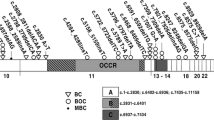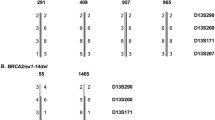Abstract
Background
For individuals genetically predisposed to breast and ovarian cancer through inheritance of a mutant BRCA allele, somatic loss of heterozygosity affecting the wild-type allele is considered obligatory for cancer initiation and/or progression. However, several lines of evidence suggest that phenotypic effects may result from BRCA haploinsufficiency.
Methods
Archival fixed and embedded tissue specimens from women with germ line deleterious mutations in BRCA1 or BRCA2 were identified. After pathologic review, focal areas of normal breast epithelium, atypical ductal hyperplasia, ductal carcinoma-in-situ, and invasive ductal carcinoma were identified from 14 BRCA1-linked and 9 BRCA2-linked breast cancers. Ten BRCA-linked prophylactic mastectomy specimens and 12 BRCA-linked invasive ovarian carcinomas were also studied. Laser catapult microdissection was used to isolate cells from the various pathologic lesions and corresponding normal tissues. After DNA isolation, real-time polymerase chain reaction assays were used to quantitate the proportion of wild-type to mutant BRCA alleles in each tissue sample.
Results
Quantitative allelotyping of microdissected cells revealed a high level of heterogeneity in loss of heterozygosity within and between preinvasive lesions and invasive cancers from BRCA1 and BRCA2 heterozygotes with breast cancer. In contrast, all BRCA-associated ovarian cancers displayed complete loss of the wild-type BRCA allele.
Conclusions
These data suggest that loss of the wild-type BRCA allele is not required for BRCA-linked breast tumorigenesis, which would have important implications for the genetic mechanism of BRCA tumor suppression and for the clinical management of this patient population.


Similar content being viewed by others
REFERENCES
Buchholz TA, Wu X, Hussain A, et al. Evidence of haplotype insufficiency in human cells containing a germline mutation in BRCA1 or BRCA2. Int J Cancer 2002; 97:557–61
Foray N, Randrianarison V, Marot D, Perricaudet M, Lenoir G, Feunteun J. Gamma-rays–induced death of human cells carrying mutations of BRCA1 or BRCA2. Oncogene 1999; 18:7334–42
King TA, Gemignani ML, Li W, et al. Increased progesterone receptor expression in benign epithelium of BRCA1-related breast cancers. Cancer Res 2004; 64:5051–3
Goggins M, Hruban RH, Kern SE. BRCA2 is inactivated late in the development of pancreatic intraepithelial neoplasia. Am J Pathol 2000; 156:1767–71
Mikaelsdottir EK, Valgeirsdottir S, Eyfjord JE, Rafnar T. The Icelandic founder mutation BRCA2 999del5: analysis of expression. Breast Cancer Res 2004; 6:R284–90
Bennett LM, McAllister KA, Malphurs J, et al. Mice heterozygous for a Brca1 or Brca2 mutation display distinct mammary gland and ovarian phenotypes in response to diethylstilbestrol. Cancer Res 2000; 60:3461–9
Warren M, Lord C, Masabanda J, Griffin D, Ashworth A. Phenotypic effects of heterozygosity for a BRCA2 mutation. Hum Mol Genet 2003; 12:2645–56
Kauff ND, Brogi E, Scheuer L, et al. Epithelial lesions in prophylactic mastectomy specimens from women with BRCA mutations. Cancer 2003; 97:1601–8
Afonina I, Zivarts M, Kutyavin I, Lukhtanov E, Gamper H, Meyer RB. Efficient priming of PCR with short oligonucleotides conjugated to a minor groove binder. Nucl Acids Res 1997; 25:2657–60
Kutyavin IV, Afonina IA, Mills A, et al. 3′-Minor groove binder-DNA probes increase sequence specificity at PCR extension temperatures. Nucl Acids Res 2000; 28:655–61
Afonina IA, Reed MW, Lusby E, Shishkina IG, Belousov YS. Minor groove binder-conjugated DNA probes for quantitative DNA detection by hybridization-triggered fluorescence. Biotechniques 2002; 32:940–9
Germer S, Holland MJ, Higuchi R. High-throughput SNP allele-frequency determination in pooled DNA samples by kinetic PCR. Genome Res 2000; 10:258–66
Deng G, Lu Y, Zlotnikov G, Thor AD, Smith HS. Loss of heterozygosity in normal tissue adjacent to breast carcinomas. Science 1996; 274:2057–9
Cavalli LR, Singh B, Isaacs C, Dickson RB, Haddad BR. Loss of heterozygosity in normal breast epithelial tissue and benign breast lesions in BRCA1/2 carriers with breast cancer. Cancer Genet Cytogenet 2004; 149:38–43
Kordon EC, Smith GH. An entire functional mammary gland may comprise the progeny from a single cell. Development 2000; 125:1921–30
Larson PS, de las Morenas A, Bennett SR, Cupples LA, Rosenberg CL. Loss of heterozygosity or allele imbalance in histologically normal breast epithelium is distinct from loss of heterozygosity or allele imbalance in co-existing carcinomas. Am J Pathol 2002; 161:283–90
Kinzler KW, Vogelstein B. Gatekeepers and caretakers. Nature 1997; 386:761–3
Venkitaraman AR. Cancer susceptibility and the functions of BRCA1 and BRCA2. Cell 2002; 108:171–82
Smith SA, Easton DF, Evans DG, Ponder BA. Allele losses in the region 17q12–21 in familial breast and ovarian cancer involve the wild-type chromosome. Nat Genet 1992; 2:128–31
Neuhausen SL, Marshall CJ. Loss of heterozygosity in familial tumors from three BRCA1-linked kindreds. Cancer Res 1994; 54:6069–72
Merajver SD, Frank TS, Xu J, et al. Germline BRCA1 mutations and loss of the wild-type allele in tumors from families with early-onset breast and ovarian cancer. Clin Cancer Res 1995; 1:539–44
Cornelis RS, Neuhausen SL, Johansson O, et al. High allele loss rates at 17q12–q21 in breast and ovarian tumors from BRCA1-linked families. Genes Chromosomes Cancer 1995; 13:203–10
Gudmundsson J, Johannesdottir G, Bergthorsson JT, et al. Different tumor types from BRCA2 carriers show wild-type chromosome deletions on 13q12-q13. Cancer Res 1995; 55:4830–2
Collins N, McManus R, Wooster R, et al. Consistent loss of the wild type allele in breast cancers from a family linked to the BRCA2 gene on chromosome 13q12–13. Oncogene 1995; 10:1673–5
Tomlinson IPM, Lambros MBK, Roylance RR. Loss of heterozygosity analysis: practically and conceptually flawed? Genes Chromosomes Cancer 2002; 34:349–53
Dobrovic A, Simpfendorfer D. Methylation of the BRCA1 gene in sporadic breast cancer. Cancer Res 1997; 57:3347–50
Esteller M, Silva JM, Dominguez G, et al. Promoter hypermethylation and BRCA1 inactivation in sporadic breast and ovarian tumors. J Natl Cancer Inst 2000; 92:564–9
Collins N, Wooster R, Stratton MR. Absence of methylation of CpG dinucleotides within the promoter of the breast cancer susceptibility gene BRCA2 in normal tissues and in breast and ovarian cancers. Br J Cancer 1997; 76:1150–6
Esteller M, Fraga MF, Guo M, et al. DNA methylation patterns in hereditary human cancers mimic sporadic tumorigenesis. Hum Mol Genet 2001; 10:3001–7
Santarosa M, Ashworth A. Haploinsufficiency for tumour suppressor genes: when you don’t need to go all the way. Biochim Biophys Acta 2004; 1654:105–22
ACKNOWLEDGMENTS
This work was supported by grants from the Breast Cancer Research Foundation, the W. M. Keck Foundation, and the National Institutes of Health (R01 CA71840).
Author information
Authors and Affiliations
Corresponding author
Rights and permissions
About this article
Cite this article
King, T.A., Li, W., Brogi, E. et al. Heterogenic Loss of the Wild-Type BRCA Allele in Human Breast Tumorigenesis. Ann Surg Oncol 14, 2510–2518 (2007). https://doi.org/10.1245/s10434-007-9372-1
Received:
Accepted:
Published:
Issue Date:
DOI: https://doi.org/10.1245/s10434-007-9372-1




